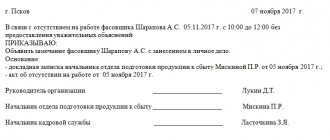Article 193 of the Labor Code is devoted to the processes of application by the head of an organization of disciplinary sanctions against staff.
It describes the procedure for this application, and also lists the restrictions that apply to these penalties. Labor Code of the Russian Federation
dated December 30, 2001 N 197-FZ
Full text of the article, guides, additional information - in ConsultantPlus
Labor discipline requirements for employees
Each new member of the work collective must obey a certain set of rules of conduct that exist within it (Article 21, 189 of the Labor Code of the Russian Federation). The basis of these rules is the requirements of the Labor Code of the Russian Federation, and all other norms are divided into 2 categories:
- developed for the entire team (Article 189 of the Labor Code of the Russian Federation);
- established for a specific employee (Article 192 of the Labor Code of the Russian Federation).
The norms that guide the entire team are based on internal organizational and administrative documents (rules, instructions, orders) and the collective agreement. They establish common rules of conduct for everyone and a uniform work routine.
The rules relating to a specific employee are contained in the employment contract with him and in his job description, defining the range of job responsibilities assigned to him.
Each employee is required to be familiarized with the current rules. This happens when:
- applying for a job;
- transfer to a new position or change in job description;
- the emergence of new internal organizational and administrative documents or a new collective agreement.
The fact of such familiarization is noted with the employee’s handwritten signature either under the relevant document or in special accounting journals.
If an employee violates the established rules, the employer has the right to bring him to disciplinary liability (Articles 22, 192 of the Labor Code of the Russian Federation).
Article 192 of the Labor Code of the Russian Federation. Disciplinary sanctions (current version)
clause 5 - repeated failure by an employee to fulfill work duties without good reason, if he has a disciplinary sanction;
clause 6 - one-time gross violation of labor duties by an employee;
clause 7 - guilty actions giving grounds for loss of confidence, committed by an employee at the place of work and in connection with the performance of his job duties;
clause 7.1 - the employee’s failure to take measures to prevent or resolve a conflict of interest to which he is a party, failure to provide or provision of incomplete or unreliable information about his income, expenses, property and property-related obligations, or failure to provide or provision of knowingly incomplete or unreliable information about income, expenses, property and property obligations of their spouse and minor children, opening (availability) of accounts (deposits), storing cash and valuables in foreign banks located outside the territory of the Russian Federation, ownership and (or) use of foreign financial tools by the employee, his spouse and minor children in cases provided for by the Labor Code, other federal laws, regulatory legal acts of the President of the Russian Federation and the Government of the Russian Federation, if these actions give rise to a loss of confidence in the employee on the part of the employer;
clause 8 - an immoral offense committed by an employee at the place of work and in connection with the performance of his job duties;
clause 9 - adoption of an unjustified decision by the head of the organization (branch, representative office), his deputies and the chief accountant, which resulted in a violation of the safety of property, its unlawful use or other damage to the property of the organization;
clause 10 - a one-time gross violation by the head of the organization (branch, representative office), or his deputies of their labor duties (see commentary to Article 81).
A disciplinary sanction is also the dismissal of a teaching employee for repeated gross violation of the charter of an educational institution within one year (Article 336 of the Labor Code, see commentary to it), as well as the dismissal of an athlete in connection with his sports disqualification for a period of six months or more or for violation by an athlete, incl. one-time, all-Russian anti-doping rules and (or) anti-doping rules approved by international anti-doping organizations, recognized as a violation by decision of the relevant anti-doping organization (Article 348.11 of the Labor Code, see commentary to it).
3. In accordance with Part 3 of the commented article, dismissal on the grounds provided for in paragraphs 7, 7.1 and 8 of Part 1 of Art. 81 of the Labor Code is a disciplinary sanction only if the guilty actions specified in these paragraphs were committed by the employee at the place of work in connection with the performance of his job duties.
If such actions or an immoral offense were committed by an employee outside the place of work or at the place of work, but not in connection with the performance of his job duties, dismissal on these grounds is not a disciplinary sanction. In this case, the general rules for bringing employees to disciplinary liability do not apply (see commentary to Articles 81 and 193).
The list of disciplinary sanctions provided for in Art. 192 of the Labor Code is not exhaustive. Federal law, charter or regulations on discipline established by federal law may provide for other disciplinary sanctions for certain categories of employees. However, disciplinary sanctions established by other federal laws, charters and discipline regulations are applied only to those employees who, in accordance with them, are subject to their action.
It should be noted that the application of any other penalty for committing a disciplinary offense that is not provided for by the Labor Code, federal laws or statutes (regulations) on discipline established by federal laws is illegal (for example, the collection of a fine).
Based on this, the Supreme Court of the Russian Federation, by decisions dated May 24, 2002 N GKPI2002-375 and dated October 28, 2002 N GKPI2002-1100, declared the norms of the Regulations on Discipline of Railway Transport Workers of the Russian Federation, approved, to be inconsistent with the Labor Code and not subject to application. Decree of the Government of the Russian Federation of August 25, 1992 N 621, providing for additional types of disciplinary sanctions for committing disciplinary offenses. In support of the decisions taken, the Supreme Court indicated that the application of disciplinary measures to an employee is a significant restriction of a person’s rights to work, and therefore the types of disciplinary sanctions and the grounds for their application can only be established by federal laws, as provided for in Art. Art. 192 and 330 TK.
4. The right to choose a specific disciplinary sanction belongs to the employer. However, the severity of the offense committed and the circumstances under which it was committed must be taken into account. The Supreme Court of the Russian Federation specifically drew the attention of the courts to the need to take these circumstances into account. As noted in the Resolution of the Plenum of the Armed Forces of the Russian Federation dated March 17, 2004 N 2 (clause 53), by virtue of Part 1 of Art. 46 of the Constitution of the Russian Federation, which guarantees everyone judicial protection of their rights and freedoms, and the provisions of international legal acts corresponding to it, in particular Art. 8 Universal Declaration of Human Rights, Art. 6 of the Convention for the Protection of Human Rights and Fundamental Freedoms, as well as Art. 14 of the International Covenant on Civil and Political Rights, the state is obliged to ensure the implementation of the right to judicial protection, which must be fair, competent, full and effective.
Taking this into account, and also taking into account that the court, which is the body for resolving individual labor disputes, by virtue of Part 1 of Art. 195 of the Code of Civil Procedure of the Russian Federation must make a lawful and well-founded decision; a circumstance that is significant for the correct consideration of cases of challenging a disciplinary sanction or reinstatement and subject to proof by the employer is its compliance when applying a disciplinary sanction to an employee arising from Art. Art. 1, 2, 15, 17, 18, 19, 54 and 55 of the Constitution of the Russian Federation and the general principles of legal and, consequently, disciplinary responsibility recognized by the Russian Federation as a rule of law state, such as justice, equality, proportionality, legality, guilt, humanism.
For this purpose, the employer must provide evidence indicating not only that the employee committed a disciplinary offense, but also that when imposing a penalty, the severity of this offense and the circumstances under which it was committed were taken into account (Part 5 of Article 192 of the Labor Code) , as well as the employee’s previous behavior and attitude towards work.
If, when considering a case for reinstatement at work, the court comes to the conclusion that misconduct actually occurred, but the dismissal was made without taking into account the above circumstances, the claim may be satisfied.
However, in this case, the court does not have the right to replace dismissal with another penalty, since in accordance with Art. 192 of the Labor Code, imposing a disciplinary sanction on an employee is the responsibility of the employer.
The procedure for applying disciplinary liability
The exercise of the employer's right to bring an employee to disciplinary liability will be possible only if several preconditions are met:
- The rules of labor discipline are drawn up in accordance with all the necessary requirements: approved by the manager, they indicate the date of approval, they are agreed upon with the trade union organization or have a note that such an organization was not created.
- Before committing a disciplinary offense, the employee is familiar with all the rules of labor discipline, and his signature certifying the fact of this acquaintance is available along with the date of acquaintance with the document, which he personally affixed.
Another important condition is that the employee is guilty of the offense (Article 192 of the Labor Code of the Russian Federation). He cannot be punished if his fault:
- absent;
- not related to work duties;
- not proven.
Article 193 of the Labor Code of the Russian Federation. The procedure for applying disciplinary sanctions (current version)
1. The commented article establishes the procedure (rules) for bringing employees to disciplinary liability.
In accordance with Part 1 of this article, the employer, before applying a disciplinary sanction, must require an explanation from the employee in writing. Such an explanation is necessary to clarify all the circumstances of the commission of a disciplinary offense, its illegality, as well as the degree of guilt of the employee who committed the offense. However, the employee’s failure to provide a written explanation is not an obstacle to the application of a penalty. If after two working days the employee does not provide the specified explanation, then a corresponding act is drawn up. In the event of a dispute about the legality of applying a disciplinary sanction, such an act will be evidence of the employer’s compliance with the rules for bringing to disciplinary liability.
2. Part 3 of the commented article limits the possibility of applying disciplinary sanctions to certain statutes of limitations.
A disciplinary sanction can be applied to an employee no later than one month from the date of its discovery. The one-month period for imposing a disciplinary sanction is calculated from the day the offense was discovered. The day of detection of the misconduct, from which the month period begins, is considered the day when the person to whom the employee is subordinate for work (service) became aware of the commission of the misconduct. It does not matter whether this person has the right to impose disciplinary sanctions.
The period established for applying a penalty does not count the time during which the employee was absent from work due to illness or being on vacation. In this case, vacation that interrupts the flow of a month includes all vacations provided by the employer in accordance with the law, incl. annual (main and additional), leaves in connection with training in educational institutions, leaves without pay (clause 34 of the Resolution of the Plenum of the Armed Forces of the Russian Federation dated March 17, 2004 N 2).
In cases where dismissal is applied as a disciplinary sanction, the specified period does not also include the time required to comply with the procedure for taking into account the opinion of the representative body of employees, if taking such an opinion into account is mandatory (Article 82, 373 of the Labor Code, see comment. to them).
The employee’s absence from work for other reasons, incl. in connection with the use of rest days (time off), regardless of their duration (for example, with a rotational method of organizing work), does not interrupt the flow of the specified period.
When applying a disciplinary sanction in the form of dismissal under sub. "g" clause 6, part 1, art. 81 of the Labor Code, the monthly period is calculated from the date of entry into force of a court verdict or resolution of a judge, body, official authorized to consider cases of administrative violations (clause 44 of the Resolution of the Plenum of the Armed Forces of the Russian Federation dated March 17, 2004 N 2).
It is not permitted to apply a disciplinary sanction after one month from the date of discovery of the offense or after six months from the date of its commission. If a disciplinary offense is discovered as a result of an audit, inspection of financial and economic activities or an audit, the employer has the right to apply disciplinary action to the employee within two years from the date of the offense. The time frame for the criminal proceedings does not count towards the specified time limits.
3. For each disciplinary offense, only one disciplinary sanction can be applied to an employee. However, in cases where failure to perform or improper performance due to the fault of an employee of the labor duties assigned to him continued, despite the imposition of a disciplinary sanction, the employer has the right to apply a new disciplinary sanction to him, incl. dismissal on the basis of clause 5, part 1, art. 81 TK. It must be borne in mind that the employer has the right to apply a disciplinary sanction to the employee even when, before committing the offense, he filed an application for termination of the employment contract on his own initiative, since the employment relationship in this case terminates only after the expiration of the notice period for dismissal (clause 33 Resolution of the Plenum of the Armed Forces of the Russian Federation dated March 17, 2004 No. 2).
However, an employee who has terminated his employment relationship with the employer cannot be subject to disciplinary action.
Disciplinary action is applied by the head of the organization. Other officials may apply disciplinary sanctions if such powers are granted to them by the relevant documents (charter of the organization, order of the manager, etc.).
Application of penalties for committing a disciplinary offense is a right, not an obligation of the employer. Therefore, the employer may, taking into account all the circumstances of the case, not impose a penalty on the employee who has committed a disciplinary offense, but limit himself to a conversation with him or an oral remark. When applying disciplinary action, it is necessary to strictly adhere to the rules established for this purpose. If, when imposing a disciplinary sanction, these rules are violated by the employer, the body considering the labor dispute about the legality of imposing a sanction may recognize the application of the disciplinary sanction as unlawful.
4. The application of a disciplinary sanction is formalized by an order (instruction) of the employer. The order (instruction) indicates the basis for applying the penalty, i.e. the specific disciplinary offense for which the employee is subject to disciplinary action, and its type (remark, reprimand, etc.). It must be borne in mind that in the event of a disciplinary sanction in the form of dismissal, one dismissal order is issued, and not two separate orders (an order to impose a penalty in the form of dismissal and an order to terminate the employment contract), as is sometimes the case in practice .
This circumstance was brought to the attention of the Judicial Collegium for Civil Cases of the Supreme Court of the Russian Federation. The Appeal Determination No. 60-APG12-7 dated 09.11.2012 in the case of Sh. states that the application of a disciplinary sanction to an employee in the form of dismissal and termination of an employment contract with an employee by separate orders is based on an erroneous interpretation of labor law norms.
The issuance of an order to apply a disciplinary sanction to the plaintiff in the form of dismissal in itself indicated the termination of the employment contract with him, since the grounds for dismissal specified in this order, namely clause 5 of part 1 of Art. 81 of the Labor Code, is contained in the list of grounds for termination of an employment contract at the initiative of the employer, provided for in Art. 81 TK. By virtue of clause 4, part 1, art. 77 of the Labor Code, termination of an employment contract at the initiative of the employer (Articles 71 and 81 of the Labor Code) is the basis for termination of the employment contract. Thus, the defendant had no grounds for issuing order No. 236-k dated July 4, 2012 to terminate the plaintiff’s employment contract after his dismissal on the basis of order No. 194-k dated May 30, 2012.
An order (instruction) to impose a penalty is announced to the employee against signature within three working days from the date of its publication, not counting the time the employee is absent from work. If an employee, for one reason or another, refuses to familiarize himself with the order (instruction) to apply a disciplinary sanction against him against signature, then a corresponding act is drawn up.
According to established practice, the order to impose a penalty is brought to the attention of all employees of the organization.
If, in the opinion of the employee, a disciplinary sanction was applied to him unreasonably or the penalty does not correspond to the gravity of the offense committed, he has the right to appeal the disciplinary sanction to the state labor inspectorate and (or) bodies for the consideration of individual labor disputes in the manner prescribed by law.
Comment source:
Rep. ed. Yu.P. Orlovsky “COMMENTARY ON THE LABOR CODE OF THE RUSSIAN FEDERATION”, 6th edition ACTUALIZATION
ORLOVSKY Y.P., CHIKANOVA L.A., NURTDINOVA A.F., KORSHUNOVA T.YU., SEREGINA L.V., GAVRILINA A.K., BOCHARNIKOVA M.A., VINOGRADOVA Z.D., 2014
Possible disciplinary action
Possible types of disciplinary sanctions are given in Art. 192 Labor Code of the Russian Federation. Their list is limited and does not allow for free interpretation. These types include:
- comment;
- rebuke;
- dismissal.
Although the legislation may provide for other types of punishment for certain categories of workers, such as civil servants, employees of internal affairs bodies, customs, the prosecutor's office, etc. (Article 192 of the Labor Code of the Russian Federation).
NOTE! A monetary fine cannot be used as a disciplinary sanction. For this, the employer himself may receive a fine from the labor inspectorate. And if the fined person goes to court, the employer will be obliged to reimburse him for what was withheld and to pay interest for the delay under Art. 236 of the Labor Code of the Russian Federation, and possibly compensation for moral damage. Whether it is possible to deprive employees of bonuses for misconduct, find out here.
The choice of the type of disciplinary liability is made taking into account a number of factors:
- the specific circumstances in which the violation was committed;
- characteristics of the employee’s personality and whether he has other offenses or, conversely, merits;
- assessing the severity of the consequences of the violation and the proportionality of the punishment.
Only one penalty can be imposed for one violation (Article 193 of the Labor Code of the Russian Federation). But punishment can be applied to one employee more than once, while changing the types of penalties, in cases where:
- as a result of the penalty the violation is not terminated;
- the offenses are repeated periodically;
- New types of offenses are being committed.
Two types of liability (disciplinary and material) can be applied simultaneously if, as a result of a disciplinary offense committed by an employee, material damage is caused to the employer (Article 248 of the Labor Code of the Russian Federation).
Commentary on Article 193 of the Labor Code of the Russian Federation
Part 1 of the commented article establishes that before applying a disciplinary sanction, the employer must request a written explanation from the employee. If, according to the original edition of the Labor Code, when an employee refuses to give an explanation, a corresponding act of refusal was drawn up, then in accordance with the edition of the Labor Code dated June 30, 2006, an act is drawn up if the specified explanation is not provided by the employee after two working days from the date of its request. At the same time, the employee’s failure to provide an explanation (as well as refusal to give an explanation according to the previous edition of the Labor Code) is not an obstacle to applying a disciplinary sanction.
The concept of “failure to provide an explanation” includes both situations where the employee directly refuses to provide an explanation (i.e., takes the corresponding active action), and situations where the employee does not express a direct refusal to provide an explanation, but at the same time does not provide it <1>. The previous formulation of the commented norm, obliging employers to obtain an employee’s refusal to provide an explanation or to draw up an appropriate act of refusal, put employers in a dead end, whose employees, without refusing to provide an explanation for the fact of the disciplinary offense committed, simply did not provide it. Taking this into account, the adjustment of this norm and the establishment of the rule that an employee’s failure to provide an explanation (and not just a refusal to provide one) is not an obstacle to the application of disciplinary action should certainly be assessed positively.
——————————— <1> Refuse - respond negatively to a request, demand. Refuse - express your disagreement, unwillingness to do something, not want to admit, accept something (see: Ozhegov S.I. Dictionary of the Russian language / Edited by N.Yu. Shvedova. 23rd ed., rev. M.: Russian language, 1990. P. 469).
At the same time, as before, situations are possible when an employee, when an explanation is requested from him, immediately refuses to provide it. If previously, in such a case, the employer had the right to immediately draw up an act on the employee’s refusal to give an explanation and apply a disciplinary sanction to the employee, now the employer is bound by the wording of part 1 of the commented article, since he must wait for the possible provision of an explanation from the employee within two days from the moment of his requirements. After all, it may happen that an employee who refused to provide an explanation immediately after being requested by the employer will change his decision within the above two days and still provide an explanation. Therefore, in any situation, based on the wording of Part 1 of the commented article, employers should adhere to the specified two-day period and only after that draw up a report on the employee’s failure to provide an explanation. It is also necessary to take into account that in a number of cases, an employee who violates labor discipline is not able to immediately provide a written explanation (for example, due to his being in a state of intoxication or due to difficulty caused by an injury due to a gross violation of labor protection requirements, etc. .). Taking this into account, the inclusion in the Labor Code of the requirement to draw up an act of failure to provide an explanation only after two days seems completely justified.
The right to apply disciplinary sanctions is granted only to the employer. It should be borne in mind that the employer can be not only a legal entity, but also an individual (see commentary to Article 20). According to Art. 20 of the Labor Code, the rights and obligations of the employer in labor relations are exercised by: an individual who is an employer; governing bodies of a legal entity (organization) or persons authorized by them in the manner established by the Labor Code, other federal laws and other regulatory legal acts of constituent entities of the Russian Federation, regulatory legal acts of local government bodies, constituent documents of a legal entity (organization) and local regulatory acts. The right to apply disciplinary sanctions to employees of an organization (legal entity) usually belongs to the head of the organization. In addition, the authority to bring employees of branches (representative offices) to disciplinary liability in practice is often assigned to the heads of these separate divisions.
Part 3 of the commented article establishes the maximum terms for applying disciplinary sanctions. Thus, as a general rule, disciplinary sanction is applied no later than one month from the date of discovery of the misconduct. At the same time, disciplinary action cannot be applied during the employee’s absence from work due to illness or vacation (including study). These periods are not included in the time limits established by parts 3 and 4 of the commented article for applying disciplinary sanctions. In such cases, the period is suspended. The absence of an employee from work for other reasons, including in connection with the use of rest days (time off), regardless of their duration (for example, with a rotational method of organizing work), does not interrupt the flow of the periods under consideration (clause 34 of the Resolution of the Plenum of the Armed Forces of the Russian Federation dated 17.03 .2004 N 2).
The period for applying a penalty is also suspended for the period of time necessary for the employer to take into account the opinion of the representative body of employees. The procedure for taking into account the opinion of the specified body in this case is defined in Art. 373 TK. According to the law, the need to take into account the opinion of the representative body of employees is established only in certain cases of dismissal of employees for disciplinary offenses committed by them (see commentary to Article 373).
A disciplinary sanction cannot be applied later than six months from the date of commission of the offense, and based on the results of an audit, inspection of financial and economic activities or an audit - later than two years from the date of its commission. The specified time limits do not include the time of criminal proceedings.
According to Part 5 of the commented article, only one disciplinary sanction can be applied for each disciplinary offense. Application of a new disciplinary sanction to the employee, including dismissal under clause 5, part 1, art. 81 of the Labor Code, it is permissible if failure to perform or improper performance due to the fault of the employee of the duties assigned to him continued, despite the imposition of a disciplinary sanction. At the same time, it must be borne in mind that the employer has the right to apply disciplinary sanctions to the employee even when, before committing the offense, he filed an application for termination of the employment contract on his own initiative, since the employment relationship in this case is terminated only after the expiration of the notice period for dismissal (see. clause 33 of the Resolution of the Plenum of the Armed Forces of the Russian Federation dated March 17, 2004 No. 2).
The employer issues an order (instruction) on the application of a disciplinary sanction, which is announced to the employee against signature within three working days from the date of its publication. In accordance with the amendments made to the commented article, the specified three-day period does not include the time the employee is absent from work. If the employee refuses to familiarize himself with the specified order (instruction) against signature, the employer must draw up a corresponding act.
Disciplinary sanctions are not recorded in the work record book. An exception is dismissal for violation of labor discipline, since the reason for dismissal is recorded in the work book in strict accordance with the wording of the Labor Code and with reference to the relevant article and paragraph of the law.
An employee has the right to appeal the employer’s actions in applying a disciplinary sanction to the relevant body for the consideration of individual labor disputes (CCC, court) and (or) to the state labor inspectorate. According to Art. 386 of the Labor Code, an employee can appeal an order to apply a reprimand or reprimand to him in the CCC within three months from the day he learned or should have learned about a violation of his right. If this deadline is missed for valid reasons, the CCC may restore it and resolve the dispute on the merits.
An employee also has the right to appeal the application of a disciplinary sanction (remark, reprimand, dismissal) to the court. In the event that an order to apply a reprimand or reprimand is appealed, the period during which the employee has the right to go to court is three months from the day he learned or should have learned about the violation of his right. If the dismissal is appealed, then the period for filing a lawsuit is one month from the date the employee was given a copy of the dismissal order or from the date the work book was issued (Article 392 of the Labor Code). If the deadline for going to court is missed for good reasons, it can be restored by the court.
What are the types of violations of discipline?
Disciplinary offenses are divided into two types:
- not very serious, having a one-time nature, not entailing serious consequences and usually stopping after the application of a penalty in the form of a reprimand or reprimand;
- gross, which include both systematic violations and one-time violations, but incompatible with the continuation of work.
Examples of the first type include:
- one-time delays to work or long absences from the workplace not related to job functions;
- failure to complete the usual amount of work (labor standards) or failure to meet deadlines;
- failure to comply with orders and instructions from management related to the employee’s job responsibilities;
- refusal to undergo mandatory inspections or instructions;
- refusal to prepare documents necessary for work (for example, a liability agreement).
Gross misconduct, in which the dismissal of an employee is allowed as a disciplinary sanction under the Labor Code of the Russian Federation, are:
- systematically committed disciplinary offenses (clause 5 of Article 81);
- absenteeism, which is equivalent to absence from the workplace during the day or shift, as well as more than 4 hours in a row (subparagraph “a”, paragraph 6 of Article 81);
- appearing at work under the influence of intoxicants (subparagraph “b”, paragraph 6 of Article 81);
See the article “Dismissal for drunkenness - step-by-step procedure”.
- disclosure of information considered a secret of any level (subparagraph “c”, paragraph 6 of Article 81);
- intentionally causing harm to someone else's property (subparagraph “d”, paragraph 6 of Article 81);
- creating a situation of the occurrence or high probability of the occurrence of severe consequences for people and property (subparagraph “e”, paragraph 6 of Article 81);
- committing actions that result in loss of trust (clauses 7 and 7.1 of Article 81);
- immoral act committed by the teacher (clause 8 of article 81);
- adoption by the head of an organization of a decision that entailed significant material damage to this organization (clause 9 of Article 81);
- gross violation by the head of a legal entity of his direct labor duties (clause 10 of article 81);
- repeated gross violation of the charter of an educational organization by a teacher during the year (clause 1 of Article 336 of the Labor Code of the Russian Federation);
- violation of anti-doping rules by an athlete or his disqualification (Article 348.11).
Dismissal is not mandatory. Instead, a more lenient punishment (reprimand or reprimand) may be imposed if the employer's manager, whose prerogative is usually to make such decisions, considers it more appropriate in the particular circumstances.
Contents of Art. 193 TK
At the beginning it says that the employer, even before imposing a penalty, must demand a written explanation from the subordinate who committed the violation. The subordinate is given two days to draw up this document. If an explanation has not been received within this period, then a corresponding act is drawn up.
It is separately emphasized that the absence of this explanation does not prevent the application of penalties.
The following describes restrictions on the period of use of penalties. The employer has a month to use it from the date the employee’s misconduct was discovered (the moment the manager learned about it). This period increases in the following cases:
- illness of the offending employee;
- his vacation;
- the need to take into account the opinion of the relevant body of personnel representatives.
In the next paragraph, the timing of the use of penalties is discussed in more detail. When an offense is committed, and not discovered, as mentioned earlier:
- by default, the period of application of penalties is limited to six months;
- the period is increased to two years if violations were discovered due to an appropriate audit or inspection;
- the period is three years in cases of corruption - this period does not include criminal proceedings.
It is separately emphasized that for each individual violation only one penalty is imposed - they should not be multiplied.
The employer's order for collection is presented to the employee against his signature. The period for this presentation is limited to three days from the date of issuance of the order, not counting the time the employee is absent from the workplace. If the employee does not want to get acquainted with this document, then a corresponding act is drawn up.
The conclusion states that the penalty received by the employee can be challenged by him in the labor inspectorate and/or relevant bodies for the analysis of labor disputes.
The chapter under consideration, as can be seen from its contents, prescribes in detail the order and mandatory points that the employer must take into account when deciding on the use of disciplinary sanctions in relation to offending employees. Otherwise, as confirmed by judicial practice, penalties may be declared untenable and will have to be cancelled.
Terms and procedure for imposing punishment
The Labor Code of the Russian Federation limits the time frame for applying a disciplinary sanction: no later than 1 month from the date of detection of the violation and before the expiration of six months (and for offenses of a financial nature - 2 years) from the date of commission, taking into account the periods of absence of an employee from the workplace allowed by law (Article 193 of the Labor Code of the Russian Federation) , among which:
- disease;
- vacation, time off;
- period of criminal proceedings.
Of particular importance is the sequence and extent of actions preceding the formalization of punishment:
- The fact of a violation must be immediately documented by drawing up an act signed by 3 witnesses or a memorandum from the employee’s immediate supervisor. If necessary, several such documents are drawn up, accompanying them, if possible, with other documents confirming the presence of violations.
- The employee is given 2 working days to provide written explanations of the misconduct. In case of refusal to provide an explanation, a report is drawn up.
- The employee is given 3 working days to familiarize himself with the collection order. If he refuses to sign on it, then an act is also drawn up.
How to draw up an act when an employee refuses to provide an explanation, read the material “How to draw up an act on refusal to write an explanatory note?”
Article 193. Procedure for applying disciplinary sanctions
Procedure for applying disciplinary action
Part 1 art. 193 of the Labor Code of the Russian Federation determines that the employer must require the employee to provide a written explanation of the reasons for his misconduct.
The employee is given two days to provide an explanation. If the employee does not want to comment on the situation or gives only oral explanations without describing the situation on paper, then a corresponding report is drawn up. And only after this the employer uses the permitted disciplinary measures.
Only one punishment can be imposed for . However, if the employer has suffered material damage, then along with the imposition of a disciplinary sanction, he has the right to demand compensation for losses.
Depending on the situation, the employer may make a reprimand, reprimand, or dismiss the employee for one of the permissible reasons (Article 192 of the Labor Code of the Russian Federation).
A corresponding order is issued about the decision made, which the employee must familiarize himself with within 3 days against signature. If he does not sign, then an act is drawn up.
Nothing is written about disciplinary sanctions , unless it is dismissal.
Terms of use
Parts 3 and 4 art. 193 of the Labor Code of the Russian Federation establishes the time limits for applying disciplinary sanctions.
The violator may be brought to disciplinary liability within a month from the date of discovery of the offense. The day of discovery is considered the day when the employee to whom the offending employee reports learned about the misconduct. It does not matter whether this superior employee has the right to hold him accountable or not. This point is clarified in paragraph 34 of the Resolution of the Plenum of the Supreme Court of the Russian Federation dated March 17, 2004 N 2 (as amended on September 28, 2010) “On Application.”
The countable period does not include the time when the offender was sick or on vacation.
If you count from the day the offense was committed, then the employer is given six months to apply a disciplinary sanction.
If the misconduct was established during an audit or audit of the organization’s current activities, the employer may exercise its right to punish the offending employee within two years from the date of the misconduct .
Appeal procedure
Employees who do not agree with the legality of applying Art. 193 of the Labor Code of the Russian Federation, they can file a complaint with the labor inspectorate, the commission for official disputes or the court (Part 7 of Article 193 of the Labor Code of the Russian Federation).
The complaint must be filed within three months from the day the employee learned of the reprimand or reprimand.
If the employee was fired, he is given one month to submit an application. The period begins to be calculated on the day when the dismissed employee personally received a copy of the dismissal order or work record book.
How is a penalty removed?
A penalty issued in the form of a reprimand or reprimand is lifted on one of 2 grounds (Article 194 of the Labor Code of the Russian Federation):
- Its validity period has expired (1 year from the date of imposition), provided that during this time the employee did not have any new violations. The collection is lifted automatically without any paperwork.
- Before the expiration date, if there is an initiative on the part of the employee, his immediate superior, the workforce or the employer’s manager. If the initiator is an employee, then he writes a statement addressed to the head of the employer, and if the immediate superior or work collective, a petition is drawn up. The removal of the penalty is formalized by order.
Read about the nuances of drawing up such an order in the article “Order to lift a disciplinary sanction - sample.”






